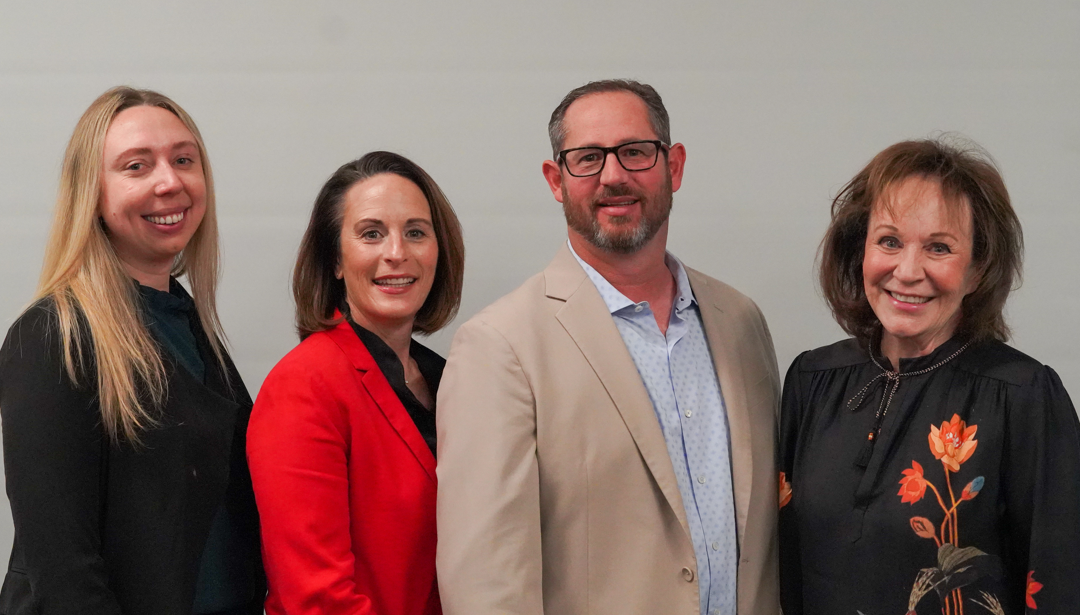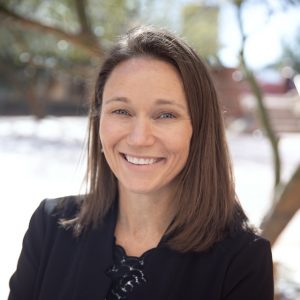The speakers at this week’s BEX Companies Healthcare Leading Market Series event showed that, while most of the crises of the last few years have passed (or at least have become the clichéd “new normal”), they taught vital lessons and influenced how development, planning and service will progress for the next several years.
Healthcare is one of the—often the—best-attended LMS sessions, and a sold-out crowd once again filled the presentation space at SkySong. As always, the panel was staffed with industry heavy hitters that anyone in A/E/C with an interest in Healthcare as a market segment would gladly make the effort to see in person. The panel consisted of:
- Wendy Cohen, President & CEO, Kitchell Corporation – Moderator;
- Sharon Harper, President & CEO, Plaza Companies;
- Rebecca Manhardt, Facilities Planning + Design, Mayo Clinic, and
- Aaron Zeligman, Senior Project Executive, Banner Health.
While past events have focused on the crisis of the moment, this year’s session showed the sector has largely weathered those storms, taken lessons to heart and is moving forward with new knowledge and an enhanced understanding of the need for flexibility and adaptability, along with a renewed focus on the overall experiences of staff, patients and their support networks.
The need for flexibility and adaptability as built-in components in healthcare’s physical structures has never been more explicitly brought into focus than during the COVID crisis. All the panelists had examples at their fingertips when Cohen asked about how the pandemic and its aftermath impacted new design and construction and the need for adaptability.
Harper cited the sixth floor of the Creighton University development at Park Central. It had originally been built as shell space for future use. During the crisis, it was fast-tracked for use as the center of the University’s grant-funded nursing program intended to quickly increase the number of trained healthcare workers in Arizona. She expressed that maintaining vertical flexibility is an exceptionally important factor in healthcare facility design.
Manhardt emphasized the need for spaces to be adaptable to meet both current and future needs. As an example, she referenced space at Mayo Clinic that had been modified to handle pre-operative needs early in the day, when most surgeries are scheduled and performed, and converted to post-operative care later in the day, eliminating periods when large areas sat dormant and enhancing staff efficiency and ability to provide consistent care.
Zeligman said that while flexibility is essential, it is impossible to actually future-proof any space and both expensive and prohibitive to actually try at too expansive a level. He said what one builds today in an attempt to handle all possible future contingencies will likely be obsolete by the time an adaptation is actually needed. “Plan, but don’t necessarily execute,” he said, telling the audience to be aware they will need to adapt space but to not get too detailed in trying to predict precisely how.
He compared healthcare and its facility design to a hub-and-spoke model and explained that as circumstances and needs adapt, what once were spokes often evolve into hubs. He said the industry cannot build spokes as future hubs, but that it must have plans in place to adapt somehow when the need for change arises.
Innovations, Focus & Ongoing Needs
The patient experience, staff needs and related issues are primary drivers in healthcare today. Items such as parking availability and orientation, along with how that parking connects to the facility, are a core healthcare design issue.
Also influencing space use is the need for family and supporting group member accommodation, particularly in neighborhoods where patients will often be accompanied by large groups of family members and others. Waiting areas, support supplies and other accommodating issues must be addressed so not only are the patients made comfortable, Harper said, but so are their groups.
Healthcare has always been a high-stress career, and COVID pushed many workers harder than anything they had ever experienced, enhancing the understanding in successful organizations that tending to staff care is one aspect of attending to patient care. Manhardt explained how design now includes optimizing exposure to natural light, providing areas of respite and other accoutrements that allow workers to maintain both their individual health and their organizational productivity.
Toward these ends, the panelists all expressed the need for collaboration and expansive interaction between facility staff and their design and construction teams. Harper emphasized the need for synergy and connection across the building team components, and all the panelists noted the benefits of working with familiar companies and people, echoing each other on the point that the more often teams work together, the more efficient they become and the more than can cross-contribute across their areas of investment and expertise.
Zeligman stressed the “bundle and save” aspect of using teams for multiple projects, saying it saves time and allows members to work together to develop creative solutions so they can be both faster and better while simultaneously tempering expectations.
Ongoing Challenges
While the code red emergencies of the past several years have largely passed and been folded into operational processes by now, many problems and challenges remain. Among those are ever-changing technologies and the need to plan, but as Zeligman said not over-plan, for accommodating them in both new and existing spaces.
There are also the ongoing economic and operational challenges faced by businesses in general and healthcare in particular. Margins are exceptionally small in healthcare, the panelists noted, and minor cost increases and revisions take a larger toll than many realize.
As with any construction and development related segment, interest rates, capitalization costs, materials and supplies, and labor all have a major impact on timelines and expenses, the panelists said.
Manhardt said optimizing the integration between new and existing spaces is an essential component and the focus must be on site logistics integrating with maintaining patient experiences as a priority. That interconnection must consider both movement and logistics, she said.
Zeligman said he did not believe the labor aspect of either development or operations could or would get better. He said the industry needs to focus on and create other ways to get things done and operate most efficiently in as many situations as possible, which he described as being able to “leverage having people do the right thing at the right time.”
As Plaza Companies focuses more on medical office and supporting space, rather than clinical, Harper kept the conversation well-grounded from the general business aspect. She reminded the audience that the Office sector has been hard hit in the post-pandemic economy, and that competition is fierce in terms of new space versus existing, or “shadow,” space that is abundant in the market.
“Programs and tenants drive everything,” she said, and design has to be flexible not only in terms of capabilities, but also of cost/SF when it comes to attracting and maintaining tenants.
Wrapping her points up concisely, Harper simply said, “At the end of the day, the tenant has to be able to afford the rent.”


 STEVE BOSCHEN
STEVE BOSCHEN WENDY COHEN
WENDY COHEN ERIC FROBERG
ERIC FROBERG



 REBEKAH MORRIS
REBEKAH MORRIS